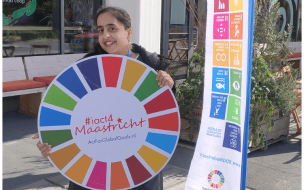Many of them are facilitated by the Internet: these days you don’t need to be in the same office as someone, or even meet them in person, to work together successfully in a company. This is both a boon and a challenge to executives, who now must manage disparate teams spread across the globe.
These changes mean that the successful businesspeople of the future will need to be able to accommodate different cultural working styles, to drive their business forward with an adaptive approach to management in different markets.
At Maastricht School of Management (MSM) in the Netherlands, the importance of this kind of multicultural adaptability is made clear from day one. The ‘Managing Cultural Diversity’ module, taught by Dr Stephanie Jones, is one of the first things that MBA students learn when they arrive at MSM.
“It’s important for us to do because when the students start off on the MBA they’re going to be working in multicultural groups from the word ‘Go’, so they need to understand how to work in this environment.
“Being able to work in multicultural teams is one of the big requirements by employers,” Stephanie explains.
Unlearning stereotypes
Indeed, Maastricht’s proximity to Belgium, Germany, and Luxembourg makes it an attractive destination to students from across the world, and the MBA cohort frequently boasts upwards of a dozen nationalities.
Giving students a crash course in multicultural diversity from day one helps them to better acclimatize to the environment of Maastricht, and helps them to thrive in their other classes, says Stephanie.
This introduction to multicultural management begins with a day spent on unlearning—freeing students from the stereotypes they may have unwittingly brought with them into the classroom.
“You’ve got to challenge prejudices and misconceptions before you can really understand and appreciate cultural differences,” says Stephanie, “so we look at popular stereotypes that people believe.
“This can be a bit shocking—when participants see this, they say what a wake-up call it is. We challenge them right from day one.”
Managing your self-expression
Once the stereotypes are banished, it’s time to replace them with real, research-led teaching on different cultures’ business practices.
One key example occurs when it comes to professionalism—what degree of emotion do different cultures accept in the workplace?
This is demonstrated through practical activities where students are asked to mime different emotions in front of the class, and the results can be quite eye-opening.
“Lots of the students come from South America, or have a Spanish or Mediterranean background—they think it’s negative to bottle emotions up, but for other cultures, when you ask them to show emotion, they find it hard and are embarrassed,” Stephanie explains.
Standing out in the workplace
Taking this kind of knowledge back into the world of work can be invaluable, not just for students but for their organizations, too.
Whether they’re working in another country which has a more affective working style, rather than being bewildered by it, alumni of the Maastricht School of Management MBA will know how to express themselves in this new environment—and similar benefits can be felt even if you’re returning to home turf.
“Say that a student is Chinese and returning to China, they may still be in businesses that want to export and have international connections,” Stephanie says. “They take their new perspectives back with them.
“Especially in China, employees are expected to share their training with their colleagues—this module enables them to explain and pass on their learning.”
Knowing how to get things done
Even for students who’ve had a lot of international exposure, the Managing Cultural Diversity module offers useful insight.
Aseem Sainudheen had worked as an entrepreneur in Dubai for more than three years prior to enrolling on the MBA at Maastricht School of Management, so he was no stranger to an international working environment.
“Dubai being a global city, I had to deal with a lot of people on a daily basis,” he says. “In the beginning I was still naïve. I was finding it hard to cope with the explanations of the different cultures and so I felt I had to learn more about it.”
The module gave Aseem a structure for his previous observations of different cultures, and models for how to get things done when working in a multicultural environment. He says that he feels like it has differentiated him from other managers who are relying on guesswork in their dealings with other cultures.
“Now I can understand why people work in different ways, what they expect from us, and how they do business,” he says. “Not stereotyping—having a proper understanding of how to deal with people.
“That’s one of the best things I got from the MBA, and it will be very beneficial for me as an entrepreneur—I want to go global, and this will definitely help me.”
The same is true even for students studying other subjects, for instance Woon Kongsom-od, a student on the Master’s in Management at MSM.
Like Aseem, Woon believes that the inter-disciplinary nature of the Managing Cultural Diversity course has provided her with the frameworks she needs to manage in a range of contexts, particularly in startups.
“The course allowed me to visualize things through a holistic lens,” Woon says.
“I would like to enhance startup business in the Asian region, so being able to understand different perspectives and apply interdisciplinary factors will lead me to success—it’s a very practical course.”








